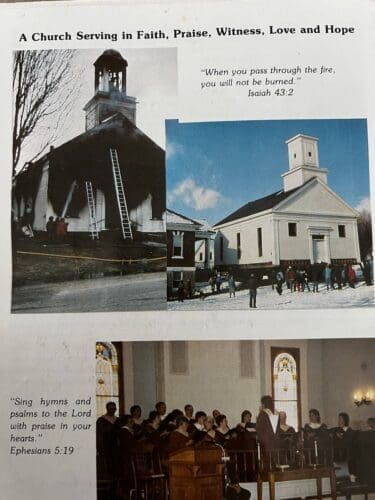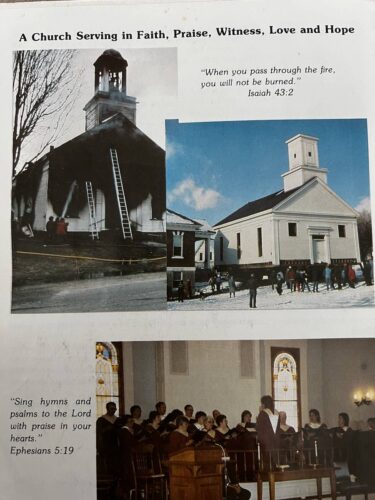
David Wood and his wife, Donna, have lived in Lincoln, Vermont, for 43 years. During those years, David served as pastor of the United Church of Lincoln for over three decades.
This week, I had the privilege of sitting down with David to discuss the church, his ministry and this incredible town Missy and I called home for the month of January.
The United Church of Lincoln has more than 150 years of ministry in the Green Mountains of Vermont. Baptist and Methodist congregations began in 1832, with both groups constructing church buildings in 1863.
In 1919, the congregations began meeting together in the village center while maintaining separate identities within their denominations. In 1976, both congregations changed their bylaws to eliminate separate memberships. Members were then able to join the United Church of Lincoln.
Three years after the congregations merged to create one church, they called the young and enthusiastic David, along with his joyful wife, Donna.
Wood was raised in upstate New York and attended college, earning a bachelor’s studying psychology and sociology. After marrying, the couple began their lives together with Donna teaching in a local public school and David working as a door-to-door insurance salesman.
While working in upstate New York, David started working with high school and middle school students. He took groups of teenagers to the Adirondack Mountains to hike and enjoy the outdoors. During one of those trips, he felt a call to ministry.
Sitting on a big rock with Donna, he told her about his call. He laughed as he remembered, “She didn’t say a word. She just jumped off the rock and swam to the dock.”
After praying about it, Donna told David they needed to save money so he could attend seminary. She ended up teaching one more year of school before they headed off to Eastern Baptist Theological Seminary (now Palmer Theological Seminary).
During his last semester in 1979, Wood began looking for his first pastorate. He recalled the letters he received from churches, letting him know they were interested in him as a candidate.
However, he received one that was quite different. Instead of being a form letter written by a typewriter, he received a handwritten note from Beverley Brown, the search committee chair at the newly reconstituted United Church of Lincoln, Vermont.
In her handwriting, Brown described the church and town. She told Wood of the church’s history, the merger of the two churches, the incredible sense of community, and all the great opportunities for a new pastor.
There was one phrase that stuck out to Wood the most: “The church has an amazing sense of humor.” Because of that phrase, Wood knew he had to find out more.
Wood spent his entire 38-year career as the pastor of the United Church of Lincoln. When asked about his long tenure, he used one word to describe his love for the place: “Real.”
UCoL is a real church, practicing real theology and doing real ministry. Wood’s use of “real” is not laced with an ounce of superiority or arrogance but is meant to describe the genuine spirit and relationship common to the town.
There is nothing fake about Lincoln. You get what you see and hear – a community built on the shared values of generosity, compassion and inclusion.
There is no greater example of those values than when the church caught on fire within two years of Wood’s arrival. Donna woke one night to the sound of the fire station siren piercing the night air. She peered out the second-story parsonage window to see flames shooting from the church basement.
The church was engulfed when the volunteer fire department assembled and began battling the blaze. They did everything they could, but ultimately David, Donna, the firefighters and the town stood in the town square, watching the church burn. It was Good Friday, 1982.
According to Wood, that moment changed both the trajectory of the church and the location of the church. The church came together. The town came together. The community rallied to begin rebuilding the church.
They restored the church and, in the process, moved the structure down the road, closer to the town square. It became a symbol of the town’s resolve and its hopeful future.
Some in the church thought Wood would leave after the fire. He had been there less than two years, and the road before them looked difficult. But Wood said he never considered leaving as he recalled many of the church’s exciting moments.
One of the most remarkable mission opportunities came immediately after the fire when an elderly woman in the community considered moving from her home. At her age, she could no longer keep up the house and worried about her own safety. Most likely, she needed to move into an independent living home away from her friends and church family.
Obviously, she was horribly disappointed that she would have to move away from her beloved Lincoln. Church members and townsfolk began thinking about how they could help her and others in the same predicament.
 Lincoln was such a special community, growing closer by the year. How could they provide affordable housing to elderly residents so they did not have to move?
Lincoln was such a special community, growing closer by the year. How could they provide affordable housing to elderly residents so they did not have to move?
The answer came when church members and local leaders launched the Weathervane Housing Project. Weathervane’s mission was to transform three buildings near the town center into 10 apartments for the area’s aging population. Since 1982, the project has housed approximately 50 residents.
Weathervane is a remarkable example of church and local leaders coming together to address community needs. Some of the church members live at Weathervane, while a growing number of residents are coming from other areas because of Lincoln’s stellar reputation.
Readers might be wondering about the housing project’s name. Weathervane is named after the church’s weathervane resting above its steeple.
This beautiful directional piece of art was the only part of the church not destroyed by the fire. It now stands at the center of the town village, pointing the town of Lincoln and her residents toward a more hopeful future.


